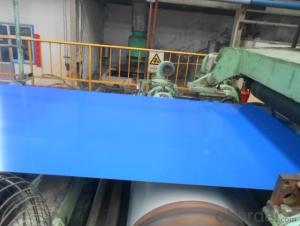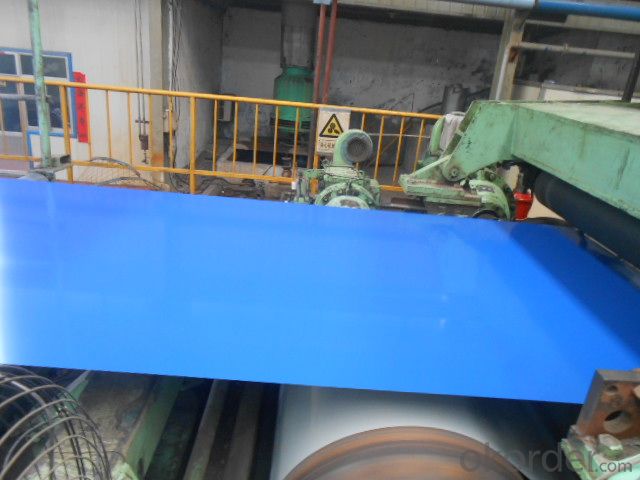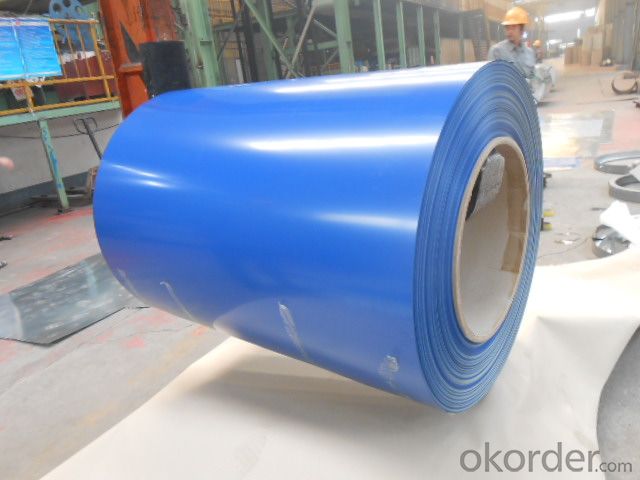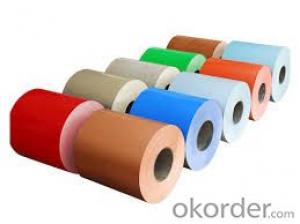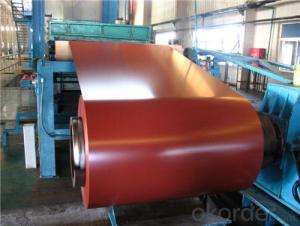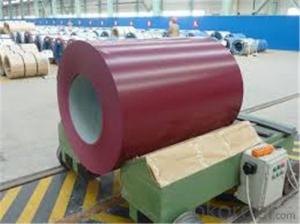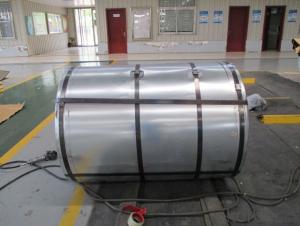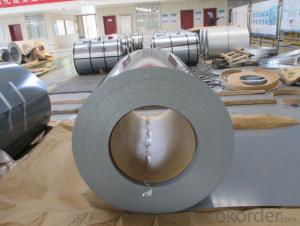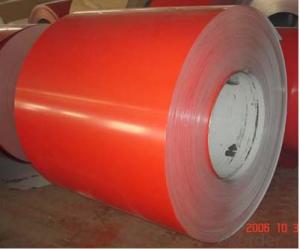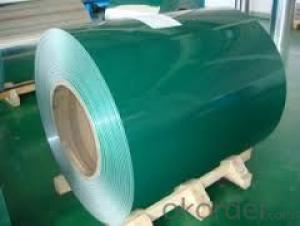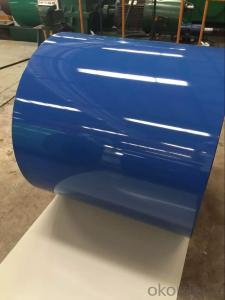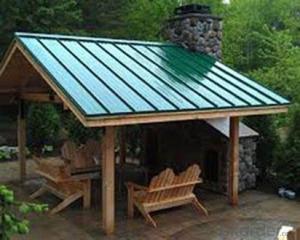hot Prime PPGI Prepainted galvanized steel coils sheets good price for roofing
- Loading Port:
- Tianjin
- Payment Terms:
- TT OR LC
- Min Order Qty:
- 25 m.t.
- Supply Capability:
- 10000 m.t./month
OKorder Service Pledge
OKorder Financial Service
You Might Also Like

Prepainted galvanized color coated PPGI steel:
| Thickness | 0.12-1.2mm |
| Width: | 700-1250mm |
| Material: | SGCC,SGCD,SECC,SECD,DX51D+Z |
| Zinc coating: | 30-180G/M2 |
| Surface Structure: | galvanized ,zero spangle, regular spangle or normal spangle |
| COLOR: | RAL number or sample colour |
| Coating: | Topside: 5micron primer +15-20microns polyester Backside: 5-8microns primer epoxy. Surface treatment: chromated and oiled, chromated and non-oiled |
II Main characteristics :
1.strong corrosion resistance
2.surface quality
3.conducive to deep processing,such as corrugated steel sheet 4.economy and practicality
III Applications:
Household Appliance:
1.Refrigerator shutter &side panels, Washer, Freezers, Air conditions,
2.Rice Cooker, Microwave Ovens, Water Heaters, Sterilization Cabinets, Range Hoods
3.Computer Panels , DVD/DVB panels, TV back panel etc.
Advantages of Our Prepainted Galvanized SteelCoil:
1) Excellent corrosion resistance: The zinc layer provides a good protection of Pre-painted Galvanizeed Steel Sheet.
2) High heat resistance: The reflective surface of the material aids in efficiently reflecting the sunlight away and in turn reducing the amount of heat transmitted. The thermal reflectivity converts into energy savings.
3) Aesthetics: Pre-Painted Galvanized steel sheet is available in plethora of patterns and multiple sizes as per the requirements that given by our customers.
4) Versatility: can be used in the various areas.
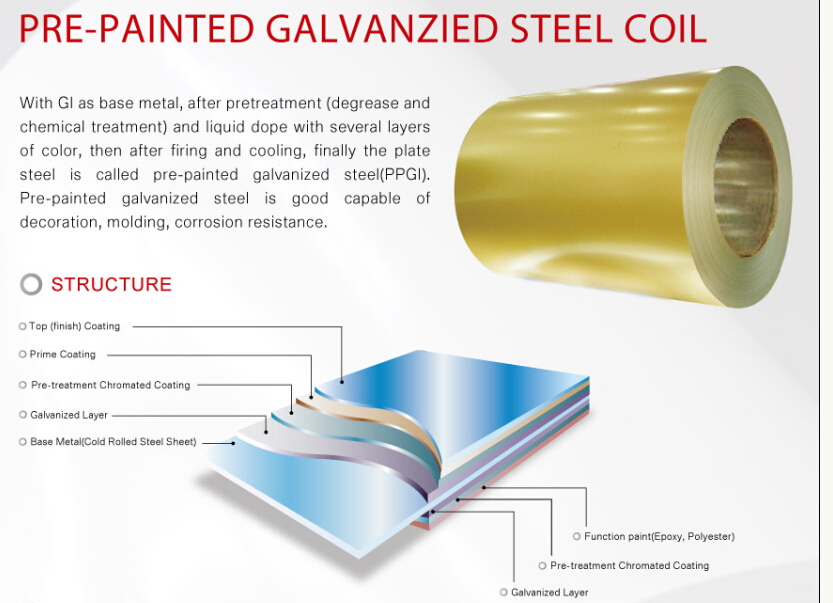
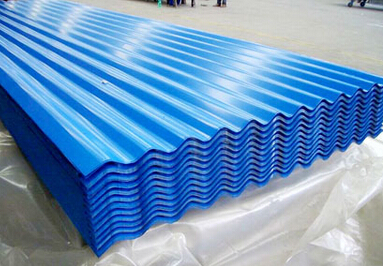
- Q: How do steel coils contribute to sustainability efforts?
- There are several ways in which steel coils contribute to sustainability efforts. Firstly, steel is a material that can be recycled and reused multiple times without losing its quality or strength. This reduces the need for virgin steel production, which is a process that requires a lot of energy and has a negative impact on the environment. By incorporating recycled steel coils into manufacturing processes, companies can significantly reduce their carbon footprint and conserve natural resources. In addition, steel coils are known for their long lifespan and durability. This means that products made using steel coils, such as automotive parts, construction materials, or appliances, also tend to last longer. This reduces the need for frequent replacements, which in turn reduces waste generation and conserves resources. Moreover, advanced technologies can be used to manufacture steel coils in a more energy-efficient way, resulting in reduced greenhouse gas emissions. Steel manufacturers are increasingly adopting sustainable practices, such as using energy-efficient furnaces, optimizing production processes, and implementing recycling initiatives. These measures help minimize the environmental impact of steel production and contribute to overall sustainability efforts. Furthermore, steel coils are widely used in the construction industry, which plays a vital role in sustainable development. Steel is a crucial component in the construction of energy-efficient buildings and infrastructure, such as green buildings and renewable energy projects. These structures are designed to minimize energy consumption, reduce emissions, and promote resource efficiency. By using steel coils in these sustainable construction projects, the industry can contribute to a greener and more sustainable future. In conclusion, the recyclability, durability, energy-efficient manufacturing processes, and role in sustainable construction make steel coils a valuable contributor to sustainability efforts. By choosing steel coils and promoting their use, companies and industries can reduce their environmental impact, conserve resources, and contribute to building a more sustainable society.
- Q: How are steel coils used in the production of HVAC ductwork?
- Due to their durability and strength, steel coils find widespread use in the production of HVAC ductwork. Galvanized steel is typically used to make these coils, as it offers protection against corrosion and extends the lifespan of the ductwork. To initiate the manufacturing process, the steel coils are unrolled and cut to the desired length. Subsequently, they are passed through a machine that shapes the steel into either a rectangular or round duct form. This shaping process employs various techniques like roll forming or press braking. Once the steel has taken the desired duct shape, it is joined together using different methods such as welding or locking mechanisms. Rectangular ducts are commonly welded, while round ducts often incorporate locking mechanisms like snap locks or Pittsburgh seams. These joining techniques ensure the ductwork is secure and airtight. Following the assembly of the ductwork, additional processes like insulation or lining may be applied. Insulation aids in minimizing heat loss or gain, while lining improves the acoustic properties of the ductwork. These supplementary steps are often undertaken to comply with specific requirements or regulations. In conclusion, steel coils are essential in the production of HVAC ductwork due to their strength, durability, and corrosion protection. Steel's versatility allows for the fabrication of ductwork in various shapes and sizes, making it a popular choice for HVAC systems.
- Q: i got the belly button ring from icing and its surgical steel are they the same things?
- There are different grades of surgical steel. I'd look for something that says, implant surgical steel. I have the same trouble as your mother, but my daughter's is worse. This is not saying that you will have problems. but better safe!
- Q: How are steel coils used in the production of agricultural implements?
- Steel coils are used in the production of agricultural implements as they are formed and shaped into various components such as blades, tines, or plowshares. These sturdy and durable steel components are then assembled into agricultural machinery like plows, cultivators, or harrows, which are essential for tasks like tilling soil, planting crops, and harvesting. The strength and resilience of steel make it an ideal material for agricultural implements, ensuring they can withstand the demanding conditions of farming and contribute to efficient and effective agricultural operations.
- Q: What is the best butcher's steel around $20? I'm looking for a good tool to straight out some kitchen knives. thanks
- get one made in germany if you can. you might want to invest in some stones. they have some great videos on youtube on how to sharpen knives.
- Q: What are the main characteristics of steel coils?
- The main characteristics of steel coils include their high strength and durability, flexibility, corrosion resistance, and ability to be easily formed and shaped. They are also known for their uniformity, as they are typically manufactured to precise dimensions and tolerances. Additionally, steel coils have excellent conductivity properties and are commonly used in various industries such as automotive, construction, and manufacturing.
- Q: Can steel coils be coated with phosphorescent materials?
- Yes, steel coils can be coated with phosphorescent materials. The phosphorescent coating can be applied to the surface of the steel coils, allowing them to emit a glow in the dark or low-light conditions.
- Q: bullets are normally made out of lead...are there bullets that are completely steel?? (not plated)
- Yes, mild steel has been used, especially in wartime when shortages of materials become problematic. The trouble with using them, though, is that they don't obturate the rifling well (plus the obvious thing that they're hard) so they tend not to shoot well, and they wear barrels quickly.
- Q: What are the different coil cutting machine options available for steel coils?
- There are several coil cutting machine options available for steel coils, each catering to different requirements and specifications. Some of the common options include: 1. Slitting Machine: This machine is used to slit the large steel coils into narrower strips or slits. It typically consists of a circular blade that moves across the width of the coil, cutting it into the desired widths. Slitting machines can handle a wide range of steel coil thicknesses and are commonly used in industries such as automotive, construction, and manufacturing. 2. Cut-to-Length Machine: This type of machine is used to cut steel coils into specific lengths. It is equipped with a shearing mechanism that cuts the coil based on the programmed length. Cut-to-length machines are particularly useful for applications where precise and consistent lengths are required, such as in the production of steel sheets or plates. 3. Rotary Shear Machine: A rotary shear machine is designed to cut steel coils into smaller pieces or squares. It utilizes a rotating drum with multiple cutting blades that shear the coil in a continuous process. This type of machine is often used in industries that require smaller steel pieces for further processing or assembly. 4. Guillotine Shear Machine: This machine is equipped with a large blade that moves vertically to cut steel coils. It is commonly used in applications where high precision and high-speed cutting are required. Guillotine shear machines can handle thicker steel coils and are often employed in heavy-duty industries such as shipbuilding and metal fabrication. 5. Laser Cutting Machine: Laser cutting machines offer a highly precise and versatile method for cutting steel coils. They use a focused laser beam to melt or vaporize the material, resulting in a clean and accurate cut. Laser cutting machines are suitable for a wide range of steel coil thicknesses and can handle complex shapes and patterns. These are just a few examples of the coil cutting machine options available for steel coils. The choice of machine depends on factors such as coil thickness, desired cutting precision, required output volume, and specific application requirements.
- Q: What are the common methods of welding steel coils?
- The common methods of welding steel coils include shielded metal arc welding (SMAW), gas metal arc welding (GMAW), flux-cored arc welding (FCAW), and submerged arc welding (SAW).
Send your message to us
hot Prime PPGI Prepainted galvanized steel coils sheets good price for roofing
- Loading Port:
- Tianjin
- Payment Terms:
- TT OR LC
- Min Order Qty:
- 25 m.t.
- Supply Capability:
- 10000 m.t./month
OKorder Service Pledge
OKorder Financial Service
Similar products
Hot products
Hot Searches
Related keywords
